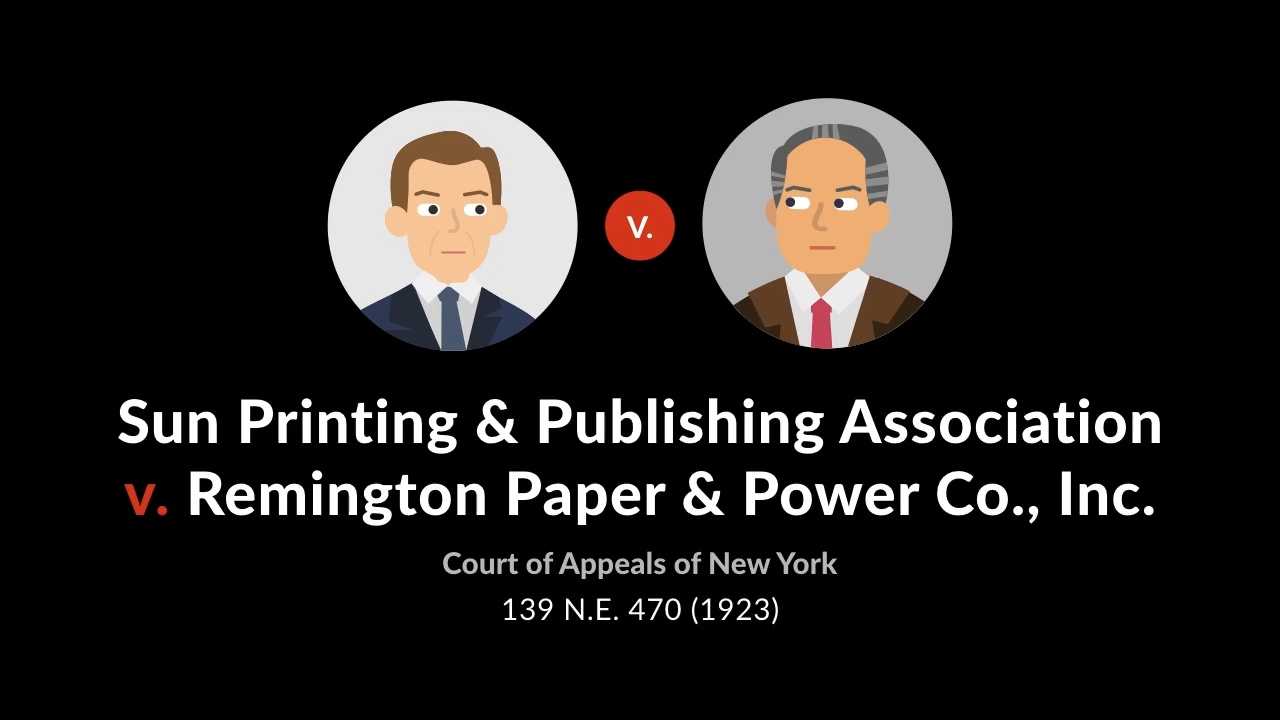Sun printing and publishing v remington – The landmark case of Sun Printing and Publishing v. Remington ignited a fierce legal battle that reshaped the landscape of media law and ethics. This case pitted two titans against each other: Sun Printing and Publishing, a powerful newspaper company, and Remington, a prominent politician.
As the legal proceedings unfolded, the nation watched with bated breath, eager to witness the outcome of a case that would forever alter the relationship between the press and the public.
The central issue at stake in Sun Printing and Publishing v. Remington revolved around the protection of confidential sources. The newspaper had published an article that exposed Remington’s alleged involvement in a bribery scandal, but refused to reveal the identity of its source.
This refusal set off a chain of events that would ultimately culminate in a Supreme Court ruling that established a qualified privilege for journalists to protect their sources.
Legal Proceedings
The legal proceedings between Sun Printing and Publishing and Remington began in 1889 when Remington sued the newspaper for libel.
Sun Printing and Publishing argued that the article was protected by the First Amendment and that Remington was a public figure who had to prove actual malice.
Remington argued that the article was false and defamatory and that Sun Printing and Publishing had not taken reasonable steps to verify the accuracy of the information before publishing it.
The case went to trial in 1890, and the jury found in favor of Remington. Sun Printing and Publishing appealed the verdict, but the New York Court of Appeals upheld the jury’s decision.
The case was a landmark decision in the law of libel, and it established the principle that public figures must prove actual malice in order to recover damages for libel.
Impact on the Newspaper Industry

The Remington case had a significant impact on the newspaper industry in the United States.
The decision made it more difficult for newspapers to publish articles about public figures without fear of being sued for libel.
As a result, newspapers became more cautious about what they published, and they began to rely more on official sources of information.
The decision also had a chilling effect on the relationship between journalists and their sources. Journalists became more reluctant to reveal the identities of their sources, and sources became more reluctant to talk to journalists.
Historical Context
The Remington case took place at a time of great social and political change in the United States.
The country was rapidly industrializing, and the population was becoming increasingly urban.
The rise of mass media, such as newspapers and magazines, was also having a major impact on American society.
The Remington case was a product of these social and political changes, and it reflected the growing tensions between the press and the public.
Ethical Considerations: Sun Printing And Publishing V Remington

The Remington case raised a number of ethical issues about the role of the press in a democracy.
Some people argued that the press has a duty to report on the actions of public figures, even if it means revealing confidential information.
Others argued that the press should not be allowed to publish information that could damage the reputation of public figures without first verifying its accuracy.
The Remington case helped to shape the ethical standards that journalists follow today.
Legacy and Impact

The Remington case has had a lasting impact on the legal system and journalism.
The decision established the principle that public figures must prove actual malice in order to recover damages for libel, and it has helped to protect the freedom of the press.
The case has also had a significant impact on the relationship between journalists and their sources, and it has raised important ethical questions about the role of the press in a democracy.
Essential FAQs
What was the central issue at stake in Sun Printing and Publishing v. Remington?
The central issue was the protection of confidential sources. Sun Printing and Publishing refused to reveal the identity of its source for an article that exposed Remington’s alleged involvement in a bribery scandal.
What was the outcome of the case?
The Supreme Court ruled that journalists have a qualified privilege to protect their sources. This means that journalists can refuse to reveal the identity of their sources in certain circumstances, such as when the information is obtained confidentially and the source’s identity is not essential to the case.
What is the legacy of Sun Printing and Publishing v. Remington?
The case established a precedent for the protection of confidential sources and continues to shape modern media law and ethics. It serves as a reminder of the importance of a free press and the vital role that journalists play in holding those in power accountable.